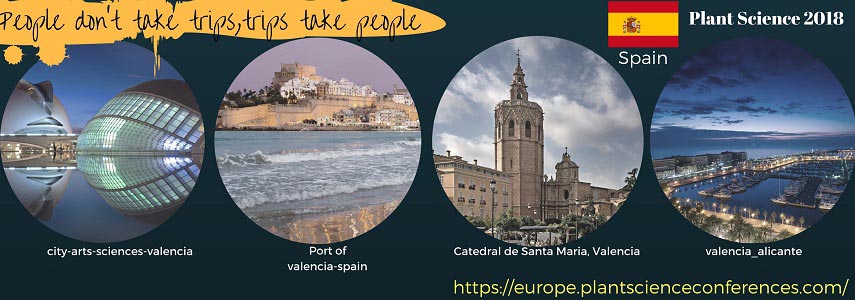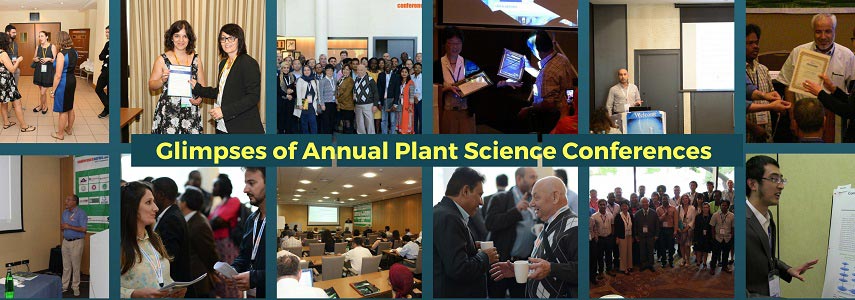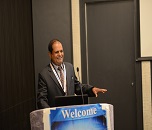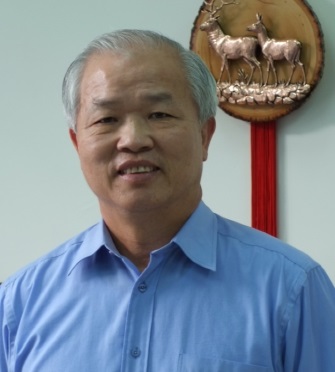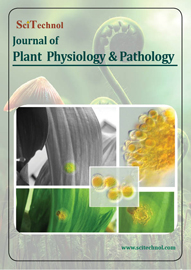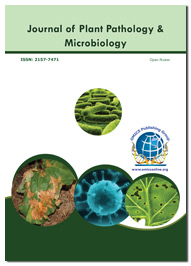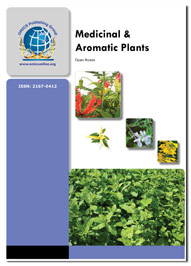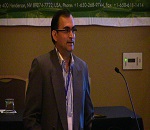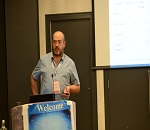Theme: Plants in a Changing Environment
Plant Science 2018
Track 1: Plant Science and Natural Products
Transgenes appear to be particularly sensitive to epigenetic variation which can lead to transgene silencing, i.e. the complete or partial inactivation of transgene expression. Plants are ideal model systems to study the influence of changing environmental conditions on epigenetic patterns. We are especially interested to understand how certain genomic regions become targets for epigenetic modification and how environmental stress affects epigenetic gene regulation. Our applied work investigates how transgene silencing can be prevented and how epigenetic variation can be exploited for novel breeding strategies
Extracting ingredients for cosmetics using green technologies
Sustainable business practices
Natural replacements for petrochemical ingredients
Chitosan as a basic for personal care products
Advances in Plant Science research
Plant produces an enormous variety of natural products with highly diverse structures. These products are commonly termed as “secondary metabolites “which are essential for plant growth and development. Secondary metabolites were formerly regarded as waste products without physiological function for the plant with the emergence of the field of the chemical ecology about 30 years ago. In addition to their physiological function in plants natural products also have a strong impact on human culture and have been used throughout human history as condiments, pigments, and pharmaceuticals.
Recommended Conferences: Plant Science Conferences | Plant Biology Conferences | Plant Biotechnology Conferences | Plant Science Conferences Rome
Related Articles:
Catalyzing plant science research with RNA-seq | A field guide to the families and genera of woody plants of Northwest South America | Open access journals in the ISI citation databases: analysis of impact factors and citation patterns: a citation study from Thomson Scientific | Shedding light on the dark data in the long tail of science | Lignin-like compounds and sporopollenin in Coleochaete, an algal model for land plant ancestry | Hydrogen peroxide—a central hub for information flow in plant cells | Occurrence of ammonia-oxidizing archaea in wastewater treatment plant bioreactors | Nitric oxide in plants: an assessment of the current state of knowledge | How plants cope with water stress in the field? Photosynthesis and growth | Growth responses of several plant species to mycorrhizae in a soil of moderate P-fertility | Carbon and nitrogen dynamics along the decay continuum: plant litter to soil organic matter| Plant root-bacterial interactions in biological control of soilborne diseases and potential extension to systemic and foliar diseases | The future of phosphite as a fungicide to control the soilborne plant pathogen Phytophthora cinnamomi in natural ecosystems
Related Conferences:
5th Global Plant Genomics Conferences, June 20-21, 2018, Rome, Italy; 11th World Agriculture Conferences, March 5-7, 2018, Paris, France; 12th International Oceanography Conferences, June 28-30, 2018, Berlin, Germany; 8th International Food Safety Conferences, June 11-13, 2018, Barcelona, Spain; 23rd Global Food Technology Conferences, May 14-16, 2018, Rome, Italy; 6th Global Plant Science Conferences, October 29-30, 2018, Valencia, Spain; 6th International Nutrition Conferences, August 16-18, 2018, Dublin, Ireland; 19th International Nutrition & Health Conferences, April 12-14, 2018, Amsterdam, Netherlands; 15th International Nutrition Meetings, May 24-26, 2018, Vienna, Austria; 21st European Nutrition Conferences, June 11-13, 2018, Dublin, Ireland; 14th International Nutraceuticals Conferences, July 19-20, 2018, London, UK; 3rd International Food Chemistry Conferences, July 16-18, 2018, Rome, Italy; 21st International Food Processing Conferences, October 11-13, 2018, Moscow, Russia; 10th Euro-Global Aquaculture Conferences, March 5-6, 2018, Paris, France; 21st Euro-Global Food and Beverages Conferences, March 8-10, 2018, Berlin, Germany; 4th Annual Plant Science Meetings , May 24-26, 2018, London, UK; 12th Congress of the International Plant Molecular Biology, August 5-10, 2018, Montpellier, France; International SPS Conference 2018: Plant Sciences for the Future, July 4-6, 2018, Campus Paris-Saclay; Plant molecular biology, June 10-15, 2018, Holderness, NH; Plant Biology, July 14-18, 2018 Montreal, Canada; 20th International Conference on Agriculture and Biotechnology, November 15 - 16, 2018,Cape Town, South Africa; International Association for Plant Biotechnology Congress, August 19-24 2018, Dublin
Related Societies:
Europe: The Federation of European Societies of Plant Biology, Society for Medicinal Plant and Natural Product Research, British Agricultural History Society
USA: Crop Science Society of America, Botanical Society of America, American Society of Agronomy, American Phytopathological Society, Botanical Society of America
Asia: Entegy for Asian Pacific Weed Science Society, International Society for Southeast Asian Agricultural Sciences, International Association for the Plant Protection Sciences
Track 2: Plant Bio-technology and Plant Tissue Culture
Plant Biotechnology is prominent in the field of medicine interfacing biotechnology and bioinformatics, the molecular characterization of medicinal plants; molecular farming; and result from Plant Biochemistry, nanotechnology, Plant pharmacology, agriculture, Biomass and biofuels as well. Plant tissue culture is the growth of plant cells outermost an intact plant. It depends on maintaining plant tissue in lab conditions on a suitable nutrient medium. The culture can be sustained as a mass of undifferentiated cells for a broad area for a period of time, or regenerated into whole plants. The dissimilar techniques used in plant tissue culture. Plant tissue culture is mostly used to produce clones of a plant in a method known as micro-propagation with different stages. Plant Biotechnology is the technology which is used for getting modern product with high yield and at faster rate.
2.1 Micropropagation in Plants
2.2 Green Plant Biotechnology
2.3 Biomass, Biofuel and By-products
2.4 Recent advances in Plant Biotechnology
2.5 Plant Reproduction and Development
2.6 Plant Cell Biology and Plant Genetic Engineering
Plant biotechnology is the product of interaction between sciences of biology and technology.it is the technological exploitation and control of biological systems. An important aspect of all plant biotechnology processes is the culture of either the microorganisms or plant cells or tissues and organs in artificial media.
Plant tissue culture is a system of developing plant cells, tissues, organs, seeds or other plant parts in a sterile situation on a supplement medium. Plant Tissue Cultures are generally initiated from multicellular tissue fragments, called explants, obtained from living plants. Explants may originate from wide range of plant tissues, such as leaf, stem, root, hypocotyl, cotyledon, embryo, or meristem.
Recommended Conferences: Plant Physiology Conferences | Plant Science Meetings | Global Plant Science Conferences | Plant Biology Conferences
Related Articles:
Phylogenetic scale in ecology and evolution | Energy Flux: The Link between Multitrophic | Biodiversity and Ecosystem Functioning | Planetary Boundaries for Biodiversity: Implausible Science, Pernicious Policies | Generalized linear mixed models: a practical guide for ecology and evolution | Defining ‘Evolutionarily Significant Units’ for conservation | Rapid determination of free proline for water-stress studies | Interactions between decomposition of plant residues and nitrogen cycling in soil | The role of arbuscular mycorrhizal fungi and glomalin in soil aggregation: comparing effects of five plant species | Rare earth elements in soil and plant systems-A review | Development of specific rhizosphere bacterial communities in relation to plant species, nutrition and soil type | Plant growth promoting rhizobacteria as biofertilizers | Stabilization mechanisms of soil organic matter: implications for C-saturation of soils | Heterogeneity of soil and plant N and C associated with individual plants and openings in North American shortgrass steppe | Potential impact of climate change on plant diseases of economic significance to Australia | Return to resistance: breeding crops to reduce pesticide dependence | Fungi associated with healthy grapevine cuttings in nurseries, with special reference to pathogens involved in the decline of young vines
Related Conferences
5th Global Plant Genomics Conferences, June 20-21, 2018, Rome, Italy; 11th World Agriculture Conferences, March 5-7, 2018, Paris, France; 12th International Oceanography Conferences, June 28-30, 2018, Berlin, Germany; 8th International Food Safety Conferences, June 11-13, 2018, Barcelona, Spain; 23rd Global Food Technology Conferences, May 14-16, 2018, Rome, Italy; 6th Global Plant Science Conferences, October 29-30, 2018, Valencia, Spain; 6th International Nutrition Conferences, August 16-18, 2018, Dublin, Ireland; 19th International Nutrition & Health Conferences, April 12-14, 2018, Amsterdam, Netherlands; 15th International Nutrition Meetings, May 24-26, 2018, Vienna, Austria; 21st European Nutrition Conferences, June 11-13, 2018, Dublin, Ireland; 14th International Nutraceuticals Conferences, July 19-20, 2018, London, UK; 3rd International Food Chemistry Conferences, July 16-18, 2018, Rome, Italy; 21st International Food Processing Conferences, October 11-13, 2018, Moscow, Russia; 10th Euro-Global Aquaculture Conferences, March 5-6, 2018, Paris, France; 21st Euro-Global Food and Beverages Conferences, March 8-10, 2018, Berlin, Germany; 4th Annual Plant Science Meetings , May 24-26, 2018, London, UK; Plant Biology Europe, June 18-21 2018, Copenhagen, DK ; International Symposium on Auxins and Cytokinins in Plant Development , July 1-6, 2018, Prague, CZ; International Congress of Plant Pathology, July 29-August 03, 2018 Boston, U.S.A; International Plant & Animal Genome XXVI, January 13-17, 2018 San, CA, USA; Annual Congress on Plant Science & Biosecurity, July 12 - 14, 2018, Valencia, Spain
Related Societies:
Europe: Agrarian society, Early agricultural society in Europe, A European Association For Agroecology, Phenology of Plant And Animal Species
USA: Botanical Society of Britain & Ireland, Torrey Botanical Society, American Society of Plant Biologists (ASPB), Botanical Society of America (BSA), California Botanical Society
Asia: International Association for the Plant Protection Sciences, Entegy for Asian Pacific Weed Science Society, International Society for Southeast Asian Agricultural Sciences
Track 3: Plant Pathology and Plant-Micro-Biology
Plant pathology is the scientific discovery of diseases in plants caused by pathogens and environmental conditions. Organisms that cause viral disease include fungi, bacteria, viruses, viroids, virus-like organisms, phytoplasma, protozoa, nematodes and dependable plants. A plant considered undesirable, unattractive, or troublesome, especially one that grows where it is no need and often grows or spreads fast or takes the place of desired plants. It is an aquatic plant or alga, especially seaweed.
3.1 Plant Microbial Interactions
3.2 plant Immune System and Plant Virology
3.3 Phytoplasma and Nematodes
3.4 Molecular and genetic basis of plant-insect interaction
3.5 Plant Diseases Epidemiology
Plant maladies in the scene and garden are imperative and can be a huge wellspring of dissatisfaction and misfortune to the nursery worker. There are around 30,000 infections of monetary significance in the U.S. Plant pathology is the investigation of biotic and abiotic specialists that reason sickness in plants of the instruments by which these easy going operators instigate ailment in plants and the techniques for averting or controlling illness and diminishing the harm caused. Illnesses caused by Fungi, Bacteria, Viruses, Nematodes.
Plant Agricultural microbiology is a field of concentrate worried about plant-related microorganisms, it is likewise manages the microbiology of soil ripeness, for example, microbial debasement of natural issue and soil supplement changes.
Recommended Conferences: Plant Biology Conferences | Plant Science Conferences 2018 | Plant Biology Hawaii
Related Articles:
Extending Joint Models in Community Ecology: A Response to Beissinger et al. | Plant Physiology and Biochemistry | Overexpression of a wheat (Triticum aestivum L.) bZIP transcription factor gene, TabZIP6, decreased the freezing tolerance of transgenic Arabidopsis seedlings by down-regulating the expression of CBFs | Secondary and sucrose metabolism regulated by different light quality combinations involved in melon tolerance to powdery mildew | Identification and functional analysis of cassava DELLA proteins in plant disease resistance against cassava bacterial blight | Occurrence of grapevine trunk disease pathogens in rootstock mother plants in South Africa | 2003 Daniel McAlpine Memorial Lecture Increasing threat of diseases to exotic plantation forests in the Southern Hemisphere: lessons from Cryphonectria canker | Potential impact of climate change on plant–pathogen interactions | Estimating disease losses to the Australian wheat industry| Diseases of Potato: A Major Constraint to Potato Production | Scientometric highlights on science and technology related review articles affiliated to India | Food System Resilience and Sustainability in Cambodia | Reproducible Research in Computational Chemistry of Materials | Determining Whether Commercial Publishers Overcharge Libraries for Scholarly Journals in the Fields of Science, Technology, and Medicine, with a Semilogarithmic … | Advances in strategic marketing and the advancement of the marketing discipline: the promise of theory | Scholarly collaboration in regional science in developing countries: The case of the Brazilian real network
Related Conferences
5th Global Plant Genomics Conferences, June 20-21, 2018, Rome, Italy; 11th World Agriculture Conferences, March 5-7, 2018, Paris, France; 12th International Oceanography Conferences, June 28-30, 2018, Berlin, Germany; 8th International Food Safety Conferences, June 11-13, 2018, Barcelona, Spain; 23rd Global Food Technology Conferences, May 14-16, 2018, Rome, Italy; 6th Global Plant Science Conferences, October 29-30, 2018, Valencia, Spain; 6th International Nutrition Conferences, August 16-18, 2018, Dublin, Ireland; 19th International Nutrition & Health Conferences, April 12-14, 2018, Amsterdam, Netherlands; 15th International Nutrition Meetings, May 24-26, 2018, Vienna, Austria; 21st European Nutrition Conferences, June 11-13, 2018, Dublin, Ireland; 14th International Nutraceuticals Conferences, July 19-20, 2018, London, UK; 3rd International Food Chemistry Conferences, July 16-18, 2018, Rome, Italy; 21st International Food Processing Conferences, October 11-13, 2018, Moscow, Russia; 10th Euro-Global Aquaculture Conferences, March 5-6, 2018, Paris, France; 21st Euro-Global Food and Beverages Conferences, March 8-10, 2018, Berlin, Germany; 4th Annual Plant Science Meetings , May 24-26, 2018, London, UK; Plant Signaling: Molecular Pathways and Network Integration (A4), January 21—24, 2018,California, USA; Advanced Microscopy Techniques for Plant-Microbe Interaction Analysis Training Course and Workshop, November 27 – December 02 2017,Vienna, Austria; International Symposium on Plant Photobiology, Jan 15-18, 2018, Matsue, Japan; International Conference on Arabidopsis Research (ICAR) , June 25-29, 2018 , Turku, Finland; Plant Sciences for the Future!, July 4-6, 2018, Saclay, Paris
Related Societies:
Europe: Distribution of Plant Species, German Society for Plant Sciences, International Association for Plant Taxonomy, American Society of Plant Biologists, European Plant Science Organisation
USA: Botanical Society of America, Ecology & Evolutionary Biology, Torrey Botanical Society, Plattsburgh Botanical Society of America, A Garden Tour for the Pacific Horticulture Society
Asia: Asian Society of Agricultural Economists, APAARI Community, Australian Agricultural and Resource Economics Society – AARES, Australia New Zealand Society for Ecological Economics – ANZSEE
Track 4: Plant Nanotechnology
The complex and different responses of plants to nanoparticles, the signal transduction mechanisms involved, and the regulation of DNA expression. Further, it shows the photosynthesis of nanoparticles, the role of nanoparticles in the antioxidant systems of botany and agriculture, the beneficial and harmful effects of nanoparticles on plants, and the application of nanoparticles and nanotubes to MS, aiming ultimately at an analysis of the metabolomics of plants. The increasing role of inventions in the field of nanotechnology is producing novel applications in the fields of biotechnology and agriculture. Nanoparticles have received much response because of the unique physico-chemical properties of these compounds. In the plant biology, nanoparticles are used as “smart” delivery systems, prompting the Nobel Prize winner P. Ehrlich support to get these components as “magic bullets.” Nanotechnology also play an important role in agriculture as compound fertilizers and minute-pesticides, acting as chemical delivery agents that target molecules to specific cellular organelles in plants.
4.1 Medicinal plant nanotechnology
4.2 Nanotechnology application in plant tissue culture
4.3 Nanotechnology applications in plant pathology
4.4 Nanotechnology in plant nutrition
Nanotechnology can possibly increment farming efficiency through hereditary change of plants, conveyance of qualities and medication particles to particular locales at cell levels and nano-exhibit based quality innovations for gene expressions in plants and animals under stress conditions. It is also can have the capacity to monitor the effects of the delivery of pharmaceuticals, probiotics, chemicals, insecticides, fungicides, vaccinations or water to people, animals, plants, insects, soils and the environment. The development of efficient and durable resistance able to withstand the extreme genetic plasticity of plant diseases therefore represents a major challenge for the coming years.
Recommended Conferences: International Conference on Plant Biology | Plant Science Meetings | Plant Conferences | Plant Environment Conferences
Related Articles:
Theoretical and Experimental Plant Physiology | Molecular plant pathology | The Top 10 fungal pathogens in molecular plant pathology | Top 10 plant pathogenic bacteria in molecular plant pathology | Top 10 plant viruses in molecular plant pathology | EuMicrobedbLite: A lightweight genomic resource and analytic platform for draft oomycete genomes | Agrobiodiversity and a sustainable food future | Improving bioscience research reporting: the ARRIVE guidelines for reporting animal research | A tale of three next generation sequencing platforms: comparison of Ion Torrent, Pacific Biosciences and Illumina MiSeq sequencers | Mind the gap: upgrading genomes with Pacific Biosciences RS long-read sequencing technology | Biodiversity hotspots revisited | Managing agricultural phosphorus for protection of surface waters: Issues and options | A fern that hyperaccumulates arsenic | Pyrosequencing enumerates and contrasts soil microbial diversity | Biogeochemistry of wetlands: science and applications | Accumulation of Pb, Cu, and Zn in native plants growing on a contaminated Florida site | Host-microbe interactions: shaping the evolution of the plant immune response| The plant immune system | Death don't have no mercy: cell death programs in plant-microbe interactions.
Related Conferences
5th Global Plant Genomics Conferences, June 20-21, 2018, Rome, Italy; 11th World Agriculture Conferences, March 5-7, 2018, Paris, France; 12th International Oceanography Conferences, June 28-30, 2018, Berlin, Germany; 8th International Food Safety Conferences, June 11-13, 2018, Barcelona, Spain; 23rd Global Food Technology Conferences, May 14-16, 2018, Rome, Italy; 6th Global Plant Science Conferences, October 29-30, 2018, Valencia, Spain; 6th International Nutrition Conferences, August 16-18, 2018, Dublin, Ireland; 19th International Nutrition & Health Conferences, April 12-14, 2018, Amsterdam, Netherlands; 15th International Nutrition Meetings, May 24-26, 2018, Vienna, Austria; 21st European Nutrition Conferences, June 11-13, 2018, Dublin, Ireland; 14th International Nutraceuticals Conferences, July 19-20, 2018, London, UK; 3rd International Food Chemistry Conferences, July 16-18, 2018, Rome, Italy; 21st International Food Processing Conferences, October 11-13, 2018, Moscow, Russia; 10th Euro-Global Aquaculture Conferences, March 5-6, 2018, Paris, France; 21st Euro-Global Food and Beverages Conferences, March 8-10, 2018, Berlin, Germany; 4th Annual Plant Science Meetings , May 24-26, 2018, London, UK; International SPS Conference 2018: Plant Sciences for the Future, 4-6 Jul 2018, Saclay, FR; International Association of Plant Biotechnology (IAPB), August 19-24, 2018, Dublin, Ireland; 10th International Conference on Biological Invasions, 4-7 Sep 2018, Dublin IE; 6th symposium on Phosphorus in Soils and Plants, September 10-13, 2018, Leuven, BE, 11th International Plant Sulfur Workshop, Sep 16-20, 2018, Conegliano, IT; Global Summit on Plant Science & Plant Physiology, March 12-14, 2018 Kuala Lumpur, Malaysia
Related Societies:
Europe: The European Plant Science Organisation, Association for European Life Science Universities, Swedish Federation Of Rural Economy And Agricultural Societies
USA: Botany Resources: Botanical Society of America, American Horticultural Society, Paleontological Society, Acoustical Society of America
Asia: Committee on Women in Agricultural Economics – CWAE, Council of Food, Agricultural and Resource Economics - C-FARE, Society for Agricultural Economics and Social Sciences
Track 5: Plant Morphology and Plant Metabolism
Plant morphology is all about with both the vegetative structures of plants, as well as the reproductive structures. It includes plant development, floral structure, pollination and fertilization. Plant morphology provides an overview of the science of deals with the external form of plants. Plant metabolism includes the complex of physical and chemical events of photosynthesis, respiration, and the process of natural compounds. Plant respiration is biochemical process in plants whereby specific substrates are oxidation with a subsequent release of carbon dioxide, CO2.
5.1 Vegetative propagation
5.2 Plant Cell Cycle and Cell Division
5.3 Primary and Secondary Growth
5.4 Pollination and fertilization
Recommended Conferences: Plant Genomics Conferences | Plant Biology Conferences 2018 | Plant Summit
Related Articles:
The Ralstonia solanacearum type III effector RipAY targets plant redox regulators to suppress immune responses | Plum pox virus capsid protein suppresses plant pathogenâ€associated molecular pattern (PAMP)â€triggered immunity | pod infections by Moniliophthora roreri result in differential Theobroma cacao gene expression depending on the clone's level of tolerance. Mol. Plant Pathol. 15, 698 … | Identification and characterization of suppressors of plant cell death (SPD) effectors from Magnaporthe oryzae |Signaling in plant-microbe interactions | Root nodulation: a paradigm for how plant-microbe symbiosis influences host developmental pathways | Bacterial effectors target the common signaling partner BAK1 to disrupt multiple MAMP receptor-signaling complexes and impede plant immunity | Human ICE/CED-3 protease nomenclature | Plant disease-resistance proteins and the gene-for-gene concept | Signal exchange in plant-microbe interactions. | Making sense of hormone crosstalk during plant immune responses
Related Conferences
5th Global Plant Genomics Conferences, June 20-21, 2018, Rome, Italy; 11th World Agriculture Conferences, March 5-7, 2018, Paris, France; 12th International Oceanography Conferences, June 28-30, 2018, Berlin, Germany; 8th International Food Safety Conferences, June 11-13, 2018, Barcelona, Spain; 23rd Global Food Technology Conferences, May 14-16, 2018, Rome, Italy; 6th Global Plant Science Conferences, October 29-30, 2018, Valencia, Spain; 6th International Nutrition Conferences, August 16-18, 2018, Dublin, Ireland; 19th International Nutrition & Health Conferences, April 12-14, 2018, Amsterdam, Netherlands; 15th International Nutrition Meetings, May 24-26, 2018, Vienna, Austria; 21st European Nutrition Conferences, June 11-13, 2018, Dublin, Ireland; 14th International Nutraceuticals Conferences, July 19-20, 2018, London, UK; 3rd International Food Chemistry Conferences, July 16-18, 2018, Rome, Italy; 21st International Food Processing Conferences, October 11-13, 2018, Moscow, Russia; 10th Euro-Global Aquaculture Conferences, March 5-6, 2018, Paris, France; 21st Euro-Global Food and Beverages Conferences, March 8-10, 2018, Berlin, Germany; 4th Annual Plant Science Meetings , May 24-26, 2018, London, UK; American Society of Plant Biologists (ASPB), July 14-18, 2018 Montreal, Canada; Regulatory Processes and Dossier Structure for the Authorisation of Plant Protection Products in the EU Berlin, Germany Apr 19 2018; Plant Signaling: Molecular Pathways and Network Integration (A4), January 21—24, 2018,California, USA; Advanced Microscopy Techniques for Plant-Microbe Interaction Analysis Training Course and Workshop, November 27- 2 December 2017,Vienna, Austria
Related Societies:
Europe: Spanish Society for Agricultural History, Italian Society of Agricultural Economics, Polish Association of Agricultural Economists and Agribusiness
USA: American Bryological and Lichenological Society, American Public Gardens Association, American Society of Plant Taxonomists, Berkshire Botanical Garden, New England Wild Flower Society
Asia: Southern Agricultural Economics Association – SAEA, Southern Association of Agricultural Experiment Station Directors – SAAESD, Sri Lanka Agricultural Economics Association – SAEA
Track 6: Plant & Forest Ecology and its Diversity
The plants require water and minerals come from the soil, while carbon dioxide comes from the air. Macronutrients and Micronutrients are the essential elements required by plants. Soil quality is a major determinant of plant distribution and growth. Nitrogen is often the mineral that has the greatest effect on plant growth. Plants require nitrogen as a component of proteins, nucleic acids, chlorophyll. Biological nitrogen fixation (BNF) occurs when atmospheric nitrogen is converted to ammonia by an enzyme called nitrogenase. Soil science is the study of soil as a natural resource on the surface of the Earth including soil formation, classification and mapping and soil erosion.
6.2 Advanced plant and Forest ecology
6.3 Application of plant and forest ecology
6.4 Components of Plant and forest ecology
The assortment and fluctuation among living life forms from all sources including entomb alia, earthly, marine and other amphibian biological communities and the environmental buildings of which they are part. Be that as it may, likewise generally acknowledged definition like numerous different neglects to specify environmental process, for example, characteristic unsettling influences, and supplement cycles and so on. Inside certain time and space, decent variety is controlled by the blend of abiotic imperatives, biotic associations, and aggravations. In Europe woodlands have assumed an imperative part science their foundation after the last ice age that finished 12,000 years back. With the expanding requests on space, timberland biological systems were increasingly used, which prompted the huge diminishing of woods zone in the entire Europe. Albeit at present biodiversity has turned into a key part of Central European backwoods, there is just a predetermined number of studies, which look at the impact of timberland administration on biodiversity.
Recommended Conferences: Plant Physiology Conferences | Plant Meetings | Plant Physiology Conferences | Plant MicroBiology Conferences | GPMB 2018
Related Articles:
Nitric oxide and salicylic acid signaling in plant defense | Plant defense guilds | Reply to Brenker et al.: The plant triterpenoid pristimerin inhibits calcium influx into human spermatozoa via CatSper | The reward of Vicia faba flowers | Scientometric highlights on science and technology related review articles affiliated to India | Reproducible Research in Computational Chemistry of Materials
Related Conferences
5th Global Plant Genomics Conferences, June 20-21, 2018, Rome, Italy; 11th World Agriculture Conferences, March 5-7, 2018, Paris, France; 12th International Oceanography Conferences, June 28-30, 2018, Berlin, Germany; 8th International Food Safety Conferences, June 11-13, 2018, Barcelona, Spain; 23rd Global Food Technology Conferences, May 14-16, 2018, Rome, Italy; 6th Global Plant Science Conferences, October 29-30, 2018, Valencia, Spain; 6th International Nutrition Conferences, August 16-18, 2018, Dublin, Ireland; 19th International Nutrition & Health Conferences, April 12-14, 2018, Amsterdam, Netherlands; 15th International Nutrition Meetings, May 24-26, 2018, Vienna, Austria; 21st European Nutrition Conferences, June 11-13, 2018, Dublin, Ireland; 14th International Nutraceuticals Conferences, July 19-20, 2018, London, UK; 3rd International Food Chemistry Conferences, July 16-18, 2018, Rome, Italy; 21st International Food Processing Conferences, October 11-13, 2018, Moscow, Russia; 10th Euro-Global Aquaculture Conferences, March 5-6, 2018, Paris, France; 21st Euro-Global Food and Beverages Conferences, March 8-10, 2018, Berlin, Germany; 4th Annual Plant Science Meetings , May 24-26, 2018, London, UK; International Symposium on Plant Photobiology, January 15-18, 2018, Matsue, Japan; International Conference on Arabidopsis Research (ICAR) June 25-29, 2018, Turku, Finland; Plant Sciences for the Future! July 4-6, 2018, Saclay, Paris; ICPGPS 2018, January 18 - 19, 2018, London, UK; International Conference on Plant Science & Genomics, May 18-19, 2018, Montreal, Canada; Global Expert Meeting On Plant Science And Molecular Biology, April 25-26, 2018, Dubai, UAE
Related Societies:
Europe: Austrian Society for Agricultural Economics, Russian Independent Agricultural Economics Association – NAEKOR, Swiss Society for Agricultural Economics and Sociology
USA: Torrey Botanical Society, Sunshine Coast Botanical Garden Society, Sunshine Coast Botanical Garden Society, American Rhododendron Society
Asia: Malaysian Agricultural Economics Association – MAEA, New Zealand Agricultural and Resource Economics Society – NZARES, Northeastern Agricultural and Resource Economics Association – NAREA
Track 7: Plant Genetics and Epigenetics
Transgenes appear to be particularly sensitive to epigenetic variation which can lead to transgene silencing, i.e. the complete or partial inactivation of transgene expression. Plants are ideal model systems to study the influence of changing environmental conditions on epigenetic patterns. We are especially interested to understand how certain genomic regions become targets for epigenetic modification and how environmental stress affects epigenetic gene regulation. Our applied work investigates how transgene silencing can be prevented and how epigenetic variation can be exploited for novel breeding strategies
Gregory Mendel plant genetics
Genotyping-by-sequencing for plant breeding and genetics
It is a promising viewpoint to grant plant worry in various plant species. Numerous logical investigations have been supporting the advancement of plant hereditary qualities. Epigenetic is an essential perspective to take care of the issues in transgenic plants, with reasonable articulation from new transgenic sections. Plants picked up the capacity to change their reaction to natural boosts. Epigenetic changes in quality articulation have captivated researchers more than a very long while. These procedures got specific consideration in plants, where they can bring about lovely varieties in prominent phenotypes, for example, pigmentation. Epigenetic control is additionally a key issue in the advancement of transgenic plants with proper articulation from recently presented transgene fragments. The term 'epigenetic' alludes to heritable quality articulation designs dictated by how the DNA of a quality is bundled as opposed to its essential DNA grouping. Qualities are firmly pressed inside DNA and they are not accessible to the translation hardware and are communicated exceptionally poor. Typically the examples of DNA bundling are precisely controlled to give unsurprising examples of quality articulation. Be that as it may, the procedure can once in a while go amiss to cause changed quality articulation. This preliminary will concentrate on very much portrayed cases of epigenetic changes in plants that shed light on the instruments hidden this principal quality control process.
Recommended Conferences: Agriculture Conferences | Plant Physiology Summit | Plant Science Conferences| Plant Biology Meetings
Related Articles:
Agrobiodiversity and a sustainable food future | Nitric oxide and salicylic acid signaling in plant defense | The interactive effects of simultaneous biotic and abiotic stresses on plants: Mechanistic understanding from drought and pathogen combination | Divergent biology of facultative heavy metal plants | Seed priming to alleviate salinity stress in germinating seeds | Reconstructing Species Relationships within the Recently Diversified GenusOdontites Ludw. (Orobanchaceae): Evidence for Extensive Reticulate Evolution
Related Conferences
5th Global Plant Genomics Conferences, June 20-21, 2018, Rome, Italy; 11th World Agriculture Conferences, March 5-7, 2018, Paris, France; 12th International Oceanography Conferences, June 28-30, 2018, Berlin, Germany; 8th International Food Safety Conferences, June 11-13, 2018, Barcelona, Spain; 23rd Global Food Technology Conferences, May 14-16, 2018, Rome, Italy; 6th Global Plant Science Conferences, October 29-30, 2018, Valencia, Spain; 6th International Nutrition Conferences, August 16-18, 2018, Dublin, Ireland; 19th International Nutrition & Health Conferences, April 12-14, 2018, Amsterdam, Netherlands; 15th International Nutrition Meetings, May 24-26, 2018, Vienna, Austria; 21st European Nutrition Conferences, June 11-13, 2018, Dublin, Ireland; 14th International Nutraceuticals Conferences, July 19-20, 2018, London, UK; 3rd International Food Chemistry Conferences, July 16-18, 2018, Rome, Italy; 21st International Food Processing Conferences, October 11-13, 2018, Moscow, Russia; 10th Euro-Global Aquaculture Conferences, March 5-6, 2018, Paris, France; 21st Euro-Global Food and Beverages Conferences, March 8-10, 2018, Berlin, Germany; 4th Annual Plant Science Meetings , May 24-26, 2018, London, UK; International Conference on Plant and Molecular Biology, February 22-24, 2018, Paris, France; 2nd Global Conference on Plant Science and Molecular Biology, September 20-22, 2018, Rome Italy; XXX International Horticultural Congress: IHC2018, August 12-14, 2018, Turkey Istanbul, 5th International Plant Phenotyping Symposium 2018, October 2-5, 2018; 20th International Conference on Plant Genomics and Plant Sciences, London, United Kingdom, January 18 - 19, 2018
Related Societies:
Europe: European Network of Agricultural and Rural Policy Research Institutes – ENARPRI, Croatian Agricultural Economics Association
USA: Botanical Society, Southern Appalachian Botanical Society, Long Island Botanical Society, Aries Systems Corporation, Nova Scotia Wild Flora Society
Asia: International Food and Agribusiness Management Association – IFAMA, Iranian Agricultural Economics Society – IAES, Korea Agricultural Economics Association – KAEA
Track 8: Plant Breeding and Molecular Breeding
Plant breeding is the technology which is used for Plant Molecular Biology to select, or in the case of genetic modification, to place particular traits into plants. Molecular breeding such as marker assisted selection and doubled haploids are immensely useful techniques. There is way that through plant breeding can also utilized by organic cultivation.
Modern Plant Breeding Techniques
Transgenic Plants and Green Revolution
Plant breeding in organic agriculture
Plant Metabolism and Metabolic Engineering
Plant/Agriculture is the think planting and reaping of plants and crowding creatures. This human creation has and keeps on affecting society and the earth. Plant rearing is a branch of agribusiness that spotlights on controlling plant heredity to grow as good as ever plant composes for use by society. Individuals in the public eye know and keen to the huge decent variety in plants and plant items. They have inclinations for specific assortments of blooms and nourishment crops. They know that though some of this variety is characteristic, people with unique ability (plant raisers) make some of it. By and large, likewise, there is a discernment that such manifestations get from intersection distinctive plants. This early on part is committed to showing a short outline of plant reproducing, including its advantages to society and some authentic points of view.
Recommended Conferences: Soil Science Conferences | Weed Science Meetings | Plant Meetings 2018 | Plant Genetics and Genomics
Related Articles:
Organization and Function of Non-dynamic Biomolecular Condensates | Gene stacking in transgenic plants–the challenge for 21st century plant biotechnology | Production of glucocerebrosidase with terminal mannose glycans for enzyme replacement therapy of Gaucher's disease using a plant cell system | Targeted knockouts of Physcomitrella lacking plantâ€specific immunogenic Nâ€glycans | The gene for fragrance in rice | A Maize phytochromeâ€interacting factors Protein ZmPIF1 Enhances Drought Tolerance by Inducing Stomatal Closure and Improves Grain Yield in Oryza sativa
Related Conferences
5th Global Plant Genomics Conferences, June 20-21, 2018, Rome, Italy; 11th World Agriculture Conferences, March 5-7, 2018, Paris, France; 12th International Oceanography Conferences, June 28-30, 2018, Berlin, Germany; 8th International Food Safety Conferences, June 11-13, 2018, Barcelona, Spain; 23rd Global Food Technology Conferences, May 14-16, 2018, Rome, Italy; 6th Global Plant Science Conferences, October 29-30, 2018, Valencia, Spain; 6th International Nutrition Conferences, August 16-18, 2018, Dublin, Ireland; 19th International Nutrition & Health Conferences, April 12-14, 2018, Amsterdam, Netherlands; 15th International Nutrition Meetings, May 24-26, 2018, Vienna, Austria; 21st European Nutrition Conferences, June 11-13, 2018, Dublin, Ireland; 14th International Nutraceuticals Conferences, July 19-20, 2018, London, UK; 3rd International Food Chemistry Conferences, July 16-18, 2018, Rome, Italy; 21st International Food Processing Conferences, October 11-13, 2018, Moscow, Russia; 10th Euro-Global Aquaculture Conferences, March 5-6, 2018, Paris, France; 21st Euro-Global Food and Beverages Conferences, March 8-10, 2018, Berlin, Germany; 4th Annual Plant Science Meetings , May 24-26, 2018, London, UK; International Conference on Agriculture, Food and Biotechnology, January 24-26, 2018, Bangkok, Thailand; The 4th African Organic Conference, November 5-8, 2018, Cameroon; The 16th New Ag Conference & Exhibition, March 19-23, 2018 Nairobi, Kenya; 4th International Conference on Food and Environmental Sciences, February 25-27, 2018; World Food and Agriculture Conference 2018, March 14-16, 2018 London, UK
Related Societies:
Europe: Italian Association of Agricultural and Applied Economics, Slovenian Association of Agricultural Economists, European Association of Agricultural Economists – EAAE
USA: Canadian Agricultural Economics Society – CAES, Mexican Society for Agricultural Management, Western Agricultural Economics Association - WAE
Asia: Indian Society of Agricultural Economics – ISAE, International Agricultural Trade Research Consortium – IATRC, International Association of Agricultural Economists – IAAE
Track 9: Plant Physiology and Biochemistry
The Study of plant physiology, growth, metabolism and reproduction in living plants and explores the chemical processes within and related to living organisms and some significant process such as photosynthesis, respiration, plant nutrition, plant hormone functions, tropisms, photo-morphogenesis, environmental physiology (plant diseases), seed germination, dormancy and different stomata function and transpiration, plant water relations. Plant biochemistry is related to molecular science such as micromolecules and plant metabolisms, Biomolecules, carbohydrates, amino acid, lipids.
1.1 Biotic and Abiotic stress in plants
1.2 Photo- morphogenesis & Photo-periodism
1.3 Plant hormones & Nutrition
1.4 Molecular Plant breeding and experimental Plant Breeding
1.5 Plant Glycobiology
1.6 Plant Physiology
Plant physiology is covered with its related branch of information natural chemistry, biophysics, and atomic science. Plants are generally thought of as flowering plants species such as trees, shrubs, vegetable crops and ornamentals. Though flowering plants constitute more than 90% of the 2, 75,000 known plant species, the plant kingdom also contains diverse group of non-flowering plants with unique biological characteristics. Non–vascular plants, such as Blue–green algae (Cyanobacteria), Algae and mosses do not have specialized water–conducting and food conducting tissues and therefore lack true leaves, stems, and roots. Then again by differentiate, vascular (both the seedless and seed– creating) plants have profoundly separated xylem and phloem cells that lead water and sustenance over awesome separation. Both plant groups are though to have evolved from common green multicellular algae more than 450 million years ago. Plant’s involved Biochemistry in utilization of solar energy by plant cells for the biosynthesis of cell components.
Recommended Conferences: Plant Biochemistry Conferences | Plant Biology Conferences | Plant Science 2018 | Plant Genetic Conferences
Related Articles:
Biogenesis and regulatory hierarchy of phased small interfering RNAs in plants | Nanotechnology, Food Security and Water Treatment | Stacking transgenic event DASâ€Ø15Ø7â€1 alters maize composition less than traditional breeding | Genome editing of the disease susceptibility gene CsLOB1 in citrus confers resistance to citrus canker | Molecular regulation and physiological functions of a novel FaHsfA2c cloned from tall fescue conferring plant tolerance to heat stress | The heatâ€shock protein/chaperone network and multiple stress resistance
Related Conferences
5th Global Plant Genomics Conferences, June 20-21, 2018, Rome, Italy; 11th World Agriculture Conferences, March 5-7, 2018, Paris, France; 12th International Oceanography Conferences, June 28-30, 2018, Berlin, Germany; 8th International Food Safety Conferences, June 11-13, 2018, Barcelona, Spain; 23rd Global Food Technology Conferences, May 14-16, 2018, Rome, Italy; 6th Global Plant Science Conferences, October 29-30, 2018, Valencia, Spain; 6th International Nutrition Conferences, August 16-18, 2018, Dublin, Ireland; 19th International Nutrition & Health Conferences, April 12-14, 2018, Amsterdam, Netherlands; 15th International Nutrition Meetings, May 24-26, 2018, Vienna, Austria; 21st European Nutrition Conferences, June 11-13, 2018, Dublin, Ireland; 14th International Nutraceuticals Conferences, July 19-20, 2018, London, UK; 3rd International Food Chemistry Conferences, July 16-18, 2018, Rome, Italy; 21st International Food Processing Conferences, October 11-13, 2018, Moscow, Russia; 10th Euro-Global Aquaculture Conferences, March 5-6, 2018, Paris, France; 21st Euro-Global Food and Beverages Conferences, March 8-10, 2018, Berlin, Germany; 4th Annual Plant Science Meetings , May 24-26, 2018, London, UK; Global Expert Meeting On Plant Science And Molecular Biology, April 25-26, 2018, Dubai, UAE; Plant Genome Evolution 2017, October 1-3, 2017, Sitges, Spain; Plant Biology Europe, June 18-21, Copenhagen, Denmark; International Conference on Plant Science & Genomics, May 18-19, 2018, Montreal, Canada; ICPGPS 2018, January 18 - 19, 2018, London, United Kingdom
Related Societies:
Europe: CLI: CropLife International (Brussels), CPVO: Community Plant Variety Office, ESA: European Seed Association, ICARDA: International Centre for Agricultural Research in Dry Areas, ISF: International Seed Federation, ISTA: International Seed Testing Association
USA: CIAT: International Center for Tropical Agriculture, CIMMYT: International Maize and Wheat Improvement Center, CPM: Commission on Phytosanitary Measures (FAO)
Asia: KOSA: Korean Seed Association, KOTRA: Korea Trade-Investment Promotion Agency, KSVS: Korean Seed and Variety Service LIAS, Landscaping Industry Association of Singapore
Track 10: Plant Genome Sciences
Plant Genome Sciences are more complex than other eukaryotic genomes, and analysis reveals many evolutionary flips and turns of the DNA sequences over time. Plants show generally different chromosome numbers and varied ploidy levels. Overall, the proportions of plant genomes (both number of chromosomes and total nucleotide base-pairs) ex-hibits the greatest variation of any kingdom in the biological world. PGS are in the field of hydroponics, the products are developed through extensive and rigorous testing by a team of world-class research scientists. The products are specifically engineered and express to work based on plants’ genetic make-up, and PGS is one of the few companies that completely understands and comprehends the need for high-yielding and fast-growing plants. PGS is set up with a vision to provide quality plant nutrients, original technological know-how and all-inclusive end-to-end solutions to the evolving agriculture industry in all parts of the country.
Plant Genome Sequencing
Crop Genomics
Plant genomics scope in Europe
Genomics of plant responses to environmental stress
Plant genomics means to succession, describe, and ponder the hereditary arrangements, structures, associations, capacities, and cooperation/systems of a whole plant genome. Its improvement and advances are firmly interconnected with proteomics, metabolomics, metagenomics, transgenomics, genomic choice, bioinformatics, epigenomics, phenomics, framework science, present day instrumentation, and mechanical autonomy sciences. Plant genomics has fundamentally progressed in the course of recent decades in the place where there are cheap, high-throughput sequencing advances and completely sequenced more than 100 plant genomes. These advances have expansive ramifications in each part of plant science and reproducing, controlled with novel genomic determination and control devices while producing numerous amazing difficulties and undertakings ahead. This Plant genomics gives some refreshed talks on current advances, difficulties, and future points of view of plant genome studies and applications.
Recommended Conferences: Soil Science 2018 | Plant Genomics Conferences | Global Plant Summit
Related Articles:
Biogenesis and regulatory hierarchy of phased small interfering RNAs in plants | Nanotechnology, Food Security and Water Treatment | Stacking transgenic event DASâ€Ø15Ø7â€1 alters maize composition less than traditional breeding | Genome editing of the disease susceptibility gene CsLOB1 in citrus confers resistance to citrus canker | Molecular regulation and physiological functions of a novel FaHsfA2c cloned from tall fescue conferring plant tolerance to heat stress | The heatâ€shock protein/chaperone network and multiple stress resistance
Related Conferences : Plant Tissue Culture | Plant Breeding | Plant Cell Culture | Plant and Agri Science | Plant and Agri Meetings
5th Global Plant Genomics Conferences, June 20-21, 2018, Rome, Italy; 11th World Agriculture Conferences, March 5-7, 2018, Paris, France; 12th International Oceanography Conferences, June 28-30, 2018, Berlin, Germany; 8th International Food Safety Conferences, June 11-13, 2018, Barcelona, Spain; 23rd Global Food Technology Conferences, May 14-16, 2018, Rome, Italy; 6th Global Plant Science Conferences, October 29-30, 2018, Valencia, Spain; 6th International Nutrition Conferences, August 16-18, 2018, Dublin, Ireland; 19th International Nutrition & Health Conferences, April 12-14, 2018, Amsterdam, Netherlands; 15th International Nutrition Meetings, May 24-26, 2018, Vienna, Austria; 21st European Nutrition Conferences, June 11-13, 2018, Dublin, Ireland; 14th International Nutraceuticals Conferences, July 19-20, 2018, London, UK; 3rd International Food Chemistry Conferences, July 16-18, 2018, Rome, Italy; 21st International Food Processing Conferences, October 11-13, 2018, Moscow, Russia; 10th Euro-Global Aquaculture Conferences, March 5-6, 2018, Paris, France; 21st Euro-Global Food and Beverages Conferences, March 8-10, 2018, Berlin, Germany; 4th Annual Plant Science Meetings , May 24-26, 2018, London, UK; 4th International Conference on Biotechnology and Agriculture Engineering, March 28-30, 2018, Okinawa, Japan; 20th International Conference on Agricultural Engineering, April 16 - 17, 2018 Lisbon, Portugal; Farming Scotland Conference, February 8-9 , 2018 Scotland, UK; The Oxford Farming Conference, January 3-5 2018 - OXFORD UNIVERSITY, UK; 27TH Annual Farming For The Future Conference, February 7-10, 2018
Related Societies:
Europe: Spanish Society for Agricultural History, Italian Society of Agricultural Economics, Polish Association of Agricultural Economists and Agribusiness
USA: FAO: Food & Agriculture Organization, GFAR: Global Forum on Agricultural Research
Asia: ICRISAT: International Crop Research Institute for the Semi-Arid Tropics, JASTA: Japan Seed Trade Association, JATAFF: Japan Association for Techno-innovation in Agriculture, Forestry and Fisheries, JICA: Japan International Cooperation Agency
Medicinal and Aromatic Plant Sciences
The importance of plants has been concluded by scholars since ancient period. Apart from the innumerable social benefits, much strength has been given to the plants of medicinal value. Majority of the population in developing countries assume on traditional system of medicine for their primary health care. Due to this increasing trend towards use of different system of medicine, natural medicinal plant resource in this world is under enormous pressure. Several Institution/ Organization/ Universities and Industries across the world have been steady in research and documentation of various conditions of these medicinal plants to frame a system for their preserving. In this way numerous research papers on each medicinal plant covering vast subject areas like Botany, Chemistry, Pharmacology, Pharmacy etc. are available. This will help the scientific community to keep themselves restore with the research and development work being implemented for a particular medicinal plant. This researcher will also be a source of favorable information for students, teachers, practitioners all those who are involved in their propagation etc.
Ornamental plants and bioactive compounds
Olive Bioactive: Applications and Prospects
Phytochemistry Experts Meeting
Drug discovery from natural sources and Herbal Medicines
Natural products in plant medicine
Recommended Conferences: Phytochemistry Conferences | International Conference on Plant Sciences | Plant Medicine Conferences
Related Articles:
Editing Plant Genomes: A new era of crop improvement | Characterization of polyploid wheat genomic diversity using a highâ€density 90 000 single nucleotide polymorphism array | Metabolic engineering of biomass for high energy density: oilseedâ€like triacylglycerol yields from plant leaves | Improving cold storage and processing traits in potato through targeted gene knockout | The Regulatory Status of Genomeâ€edited Crops | Genome editing of the disease susceptibility gene CsLOB1 in citrus confers resistance to citrus canker | Global agricultural intensification during climate change: a role for genomics
Related Conferences
5th Global Plant Genomics Conferences, June 20-21, 2018, Rome, Italy; 11th World Agriculture Conferences, March 5-7, 2018, Paris, France; 12th International Oceanography Conferences, June 28-30, 2018, Berlin, Germany; 8th International Food Safety Conferences, June 11-13, 2018, Barcelona, Spain; 23rd Global Food Technology Conferences, May 14-16, 2018, Rome, Italy; 6th Global Plant Science Conferences, October 29-30, 2018, Valencia, Spain; 6th International Nutrition Conferences, August 16-18, 2018, Dublin, Ireland; 19th International Nutrition & Health Conferences, April 12-14, 2018, Amsterdam, Netherlands; 15th International Nutrition Meetings, May 24-26, 2018, Vienna, Austria; 21st European Nutrition Conferences, June 11-13, 2018, Dublin, Ireland; 14th International Nutraceuticals Conferences, July 19-20, 2018, London, UK; 3rd International Food Chemistry Conferences, July 16-18, 2018, Rome, Italy; 21st International Food Processing Conferences, October 11-13, 2018, Moscow, Russia; 10th Euro-Global Aquaculture Conferences, March 5-6, 2018, Paris, France; 21st Euro-Global Food and Beverages Conferences, March 8-10, 2018, Berlin, Germany; 4th Annual Plant Science Meetings , May 24-26, 2018, London, UK; 12th Congress of the International Plant Molecular Biology, August 5-10, 2018, Montpellier, France; International SPS Conference 2018: Plant Sciences for the Future, July 4-6, 2018, Campus Paris-Saclay; Plant Molecular Biology, June 10-15, 2018, Holderness, NH; Plant Biology, July 14-18, 2018 Montreal, Canada; 20th International Conference on Agriculture and Biotechnology, November 15 - 16, 2018,Cape Town, South Africa; International Association For Plant Biotechnology Congress, August 19-24 2018, Dublin
Related Societies:
Europe: Germany Deutsche Bodenkundliche Gesellschaft, Greece Elliniki Edafologiki Etaireia (Greek Soil Science Society), Hungary Hungarian Society of Soil Science
USA: North Carolina - Soil Science Society of North Carolina, North Dakota - Professional Soil Classifiers Association of North Dakota, Ohio - Association of Ohio Pedologists, Oklahoma Professional Soil Science Association of Oklahoma
Asia: EAPVP: East Asia Plant Variety Protection Forum, FAORAP: FAO Regional Office for Asia & the Pacific (Bangkok), Hong Kong Seed Trade Association, ICAR: Indian Council of Agricultural Research
Track 11: Soil Science and Soil-Plant Nutrition
The plants need water and minerals come from the soil, while carbon dioxide comes from the air. Macronutrients and Micronutrients are the important elements required by plants. Soil quality is a major determinant of plant distribution and growth. Nitrogen Dioxide is often the mineral that has the more effect on plant growth. Plants require nitrogen as a component of amino acid, nucleic acids, and photosynthetic pigments. Biological nitrogen fixation (BNF) occurs when atmospheric nitrogen is converted to ammonia by an enzyme called nitrogenase. Soil science is the study of soil as a natural resource on the surface of the Earth along with soil formation, evolution and mapping and soil erosion.
Soil Fertility and Soil Biochemistry Experts Meeting
Soil Erosion and soil management Experts Meeting
Sustainable Soils and Soil Geology
Soil Morphology and soil management
Soil Health
Plants require water, carbon dioxide and a scope of follow minerals known as 'supplements' to develop. They acquire these supplements, and a large portion of their water, from the dirt. Soil is comprised of three principle things mud, humus and sand. There are additionally numerous little creatures that live in the dirt, and the greater parts of these are valuable to the plants. The supplements accessible in a given soil at last rely upon the stone from which the dirt was made. In the event that the plants developed from this dirt bite the dust and rot where they have developed then their supplements are reused. Be that as it may, if the plants have been developed for farming then they are expelled from the zone in which they have developed and their supplements can't be reused. So in soils that are utilized for editing, fundamental supplements ceaselessly must be supplanted. Plants develop in the thin upper layer of the Earth's outside layer known as soil. Soil is shaped over long circumstances from molten or sedimentary shake, volcanic powder, sand or peat. Except for peat, these are all silicate minerals, so soil is to a great extent comprised of silicates and natural material known as humus. Plants utilize this dirt for mooring and as a wellspring of supplements and water.
Recommended Conferences: Plant Science Society Meetings | Plant Genomics Conferences | Soil Science Meetings | Plant Global Conferences | Europe Plant and Agri Conferences
Related Articles:
Generation of targeted mutant rice using a CRISPRâ€Cpf1 system | TALENâ€mediated targeted mutagenesis produces a large variety of heritable mutations in rice | Postharvest Application of Some Essential Oils for Controlling Gray and Blue Moulds of Apple Fruits | The olive quick decline syndrome in south-east Italy: a threatening phytosanitary emergency | Replacement of the European wheat yellow rust population by new races from the centre of diversity in the nearâ€Himalayan region | Abiotic stresses modulate landscape of poplar transcriptome via alternative splicing, differential intron retention, and isoform ratio switching | SOIL SICKNESS AND NEGATIVE PLANT-SOIL FEEDBACK: A REAPPRAISAL OF HYPOTHESES
Related Conferences
5th Global Plant Genomics Conferences, June 20-21, 2018, Rome, Italy; 11th World Agriculture Conferences, March 5-7, 2018, Paris, France; 12th International Oceanography Conferences, June 28-30, 2018, Berlin, Germany; 8th International Food Safety Conferences, June 11-13, 2018, Barcelona, Spain; 23rd Global Food Technology Conferences, May 14-16, 2018, Rome, Italy; 6th Global Plant Science Conferences, October 29-30, 2018, Valencia, Spain; 6th International Nutrition Conferences, August 16-18, 2018, Dublin, Ireland; 19th International Nutrition & Health Conferences, April 12-14, 2018, Amsterdam, Netherlands; 15th International Nutrition Meetings, May 24-26, 2018, Vienna, Austria; 21st European Nutrition Conferences, June 11-13, 2018, Dublin, Ireland; 14th International Nutraceuticals Conferences, July 19-20, 2018, London, UK; 3rd International Food Chemistry Conferences, July 16-18, 2018, Rome, Italy; 21st International Food Processing Conferences, October 11-13, 2018, Moscow, Russia; 10th Euro-Global Aquaculture Conferences, March 5-6, 2018, Paris, France; 21st Euro-Global Food and Beverages Conferences, March 8-10, 2018, Berlin, Germany; 4th Annual Plant Science Meetings , May 24-26, 2018, London, UK; The International Conference on Arabidopsis Research (ICAR), June 25-29, 2018, Turku, Finland; 2nd Asia-Pacific Plant Phenotyping Conference, March 23 - 25, 2018, Nanjing, China; IAPB 2018: International Association for Plant Biotechnology Congress, August 19 - 24, 2018, Dublin, Ireland; ASPB Plant Biology 2018 , July 14 - 18, 2018, Montreal, Canada; 20th International Conference on Soil Science and Plant Nutrition, January 25-26, 2018, Paris, France; International Conference on Ecosystem Resilience and Agricultural Productivity, November 22-24, 2017, Kampala, Uganda
Related Societies:
Europe: Ireland Soil Science Society of Ireland, Italy Societa Italiana della Scienza del Suolo (SISS), Lithuania Lithuanian Society of Soil Science
USA: Kansas Association of Professional Soil Classifiers, Maine Maine Association of Professional Soil Scientists, Mississippi - Professional Soil Classifiers Association of Mississippi, New Mexico Association of Professional Soil Scientists
Asia: CASA: Central Asian Seed Association, CLA: CropLife Asia, CNSA: China National Seed Association, CNSTA: China National Seed Trade Association, DIPP: Department of Industrial Policy and Promotion, DMCC: Dubai Multi Commodities Center
Track 12: Forest Science and Technology
The Forest Science is a complex ecosystem consisting mainly of trees that buffer the earth and support a myriad of life forms. The trees help create a different environment which, in turn, affects the kinds of animals and plants that can continue in the forest. Trees are an important part of the environment. They clean the air, cool it on hot days, conserve heat at night, and act as attractive sound absorbers.
Plants provide a protective canopy that lessens the impact of raindrops on the soil, thereby decreasing soil erosion. The layer of leaves that fall around the tree prevents runoff and allows the water to drain into the soil. Roots help to hold the soil in place. Dead plants decompose to form humus, organic matter that holds the water and add nutrients to the soil. Plants provide habitat to different types of organisms. Birds build their nests on the branches of trees, animals and birds live in the hollows, insects and other organisms live in different parts of the plant. They produce large quantities of oxygen and take in carbon dioxide. Transpiration from the forests alters the relative humidity and precipitation in a place.
Forest Conservation
Terrestrial Ecosystem
Natural Vegetation and their Soil
Crop and Forest Science
Wood Science and Technology
With the population of the human race now exceeding 7 billion individuals, there is an increasing concern for the world’s forests and natural resources due to stresses placed upon them. The role that forests and natural resources play in our lives will continue to evolve with human development and our expanding use of the global landscape. Once perceived as an obstacle to development, the importance of forests to various cultures and many of the products forests provide are now well understood. A perplexing concern that must be addressed by current and future land managers involves addressing the needs of an ever-increasing human population without depleting or destroying natural ecosystems. Sound timberlands are fundamental for giving chances to future ages as well as for looking after biodiversity, guaranteeing species survival, meeting human immoderate needs, and tending to national security issues. The management of forests and natural resources requires knowledge that transcends disciplines as diverse as anthropology, biology, business, chemistry, ecology, economics, engineering, entomology, geography, geology, history, hydrology, mathematics, physics, psychology, and sociology. Obviously, becoming an expert in all of these fields is asking too much of an individual. However, it is important to obtain a broad understanding of the manner in which these fields complement one another with respect to forestry and natural resources. With a broad background in these areas, forest and natural resource managers will be able to understand how their management actions affect the character of natural and human systems and can assist in addressing complex economic, environmental, and social problems.
Recommended Conferences: Plant Biology 2018 | Botany Conferences | Plant Biology Annual Meeting | Plant Tissue Engineering | Biology and Environmental Conferences | Plant Biotechnology
Related Articles:
Ser360 and Ser364 in the Kinase Domain of Tomato SlMAPKKKα are Critical for Programmed Cell Death Associated with Plant Immunity | TRANSMISSION OF SPIROPLASMA CITRI IN CARROT SEEDS AND DEVELOPMENT OF A REAL-TIME PCR FOR ITS DETECTION | Role of phenolic compounds in the physiology of plant diseases and disease resistance | Survey on the occurrence of apple diseases in Korea from 1992 to 2000 | Lignification as a mechanism for induced systemic resistance in cucumber | Use of mutants to demonstrate the role of oxalic acid in pathogenicity of Sclerotinia sclerotiorum on Phaseolus vulgaris
Related Conferences
5th Global Plant Genomics Conferences, June 20-21, 2018, Rome, Italy; 11th World Agriculture Conferences, March 5-7, 2018, Paris, France; 12th International Oceanography Conferences, June 28-30, 2018, Berlin, Germany; 8th International Food Safety Conferences, June 11-13, 2018, Barcelona, Spain; 23rd Global Food Technology Conferences, May 14-16, 2018, Rome, Italy; 6th Global Plant Science Conferences, October 29-30, 2018, Valencia, Spain; 6th International Nutrition Conferences, August 16-18, 2018, Dublin, Ireland; 19th International Nutrition & Health Conferences, April 12-14, 2018, Amsterdam, Netherlands; 15th International Nutrition Meetings, May 24-26, 2018, Vienna, Austria; 21st European Nutrition Conferences, June 11-13, 2018, Dublin, Ireland; 14th International Nutraceuticals Conferences, July 19-20, 2018, London, UK; 3rd International Food Chemistry Conferences, July 16-18, 2018, Rome, Italy; 21st International Food Processing Conferences, October 11-13, 2018, Moscow, Russia; 10th Euro-Global Aquaculture Conferences, March 5-6, 2018, Paris, France; 21st Euro-Global Food and Beverages Conferences, March 8-10, 2018, Berlin, Germany; 4th Annual Plant Science Meetings , May 24-26, 2018, London, UK; Plant Biology 2018, July 14-18, 2018 Montreal, Canada; Plant Genomics & Gene Editing Congress, November 02-03 2017, Philadelphia, United States; International Summit on Organic Farming 2017, December 04 - 05, 2017, Madrid, Spain; International Congress and Expo on Agriculture & Horticulture, August 13-14, 2018 Amsterdam, Netherlands; Plant Genomics & Gene Editing Congress, November 02-03 2017, Philadelphia, United States
Related Societies:
Europe: Netherlands Nederlandse Bodemkundigen, Poland Polish Society of Soil Science (PSSS), Estonia Estonian Soil Science Society (EMTS), Finland Finnish Society of Soil Sciences, France Association Francaise pour l' Etude du Sol
USA: Idaho Soil Scientists Association, Illinois Soil Classifiers Association, Indiana Association of Professional Soil Classifiers, Iowa Association of Professional Soil Classifiers
Asia: BISA: Borlaug Institute for South Asia, BSA: Bangladesh Seed Association, BSST: Bangladesh Society of Seed Technology
Track 13: Agricultural Science
Agriculture Science deals which promotes in genetics, physiology, biochemistry, biophysics, and molecular biology. Agriculture science is related to techniques, including the application of agronomic research. Agricultural biotechnology is a specific area of agricultural science includes the use of scientific tools and techniques, including manipulation of genome, genetic markers, molecular diagnostics, vaccines, and plant biotechnology, to modify living organisms: plants, animals, and microorganisms.
Ecological Agriculture - Sustainable Agriculture
Agribusiness is an imperative branch of the national economy. It produces sustenance for individuals, nourish for stock (creatures) and a few items for specialized (modern) utilize. When all is said in done we can separate farming into two sections developing and rearing. Current farming depends intensely on designing and innovation and on the organic and physical sciences. Water system, waste, protection, and clean designing each of which is imperative in effective cultivating are a portion of the fields requiring the specific information of rural architects. Agrarian science manages other key cultivating concerns, for example, the utilization of compost, bug sprays (see Pest Control), and fungicides, soil cosmetics, investigation of horticultural items, and nutritious needs of ranch creatures. Plant rearing and hereditary qualities contribute vastly to cultivate profitability. Hereditary qualities have additionally made a study of animals reproducing. Hydroponics, a technique for soilless cultivating in which plants are developed in substance supplement arrangements, may help address the issue for more noteworthy nourishment creation as the total populace increments. The idea of agribusiness there and in different locales was to change impressively in succeeding hundreds of years. A few reasons can be recognized for this pattern. Europe was cut off from Asia and the Middle East by an augmentation of Ottoman power. New monetary hypotheses were incorporated, specifically influencing horticulture.
Recommended Conferences: Plant Biology 2018 Conferences | Plant Meetings | Plant Summit
Related Articles:
Present and future of ecological and evolutionary research in Mediterranean-type ecosystems: Conclusions from the last International Mediterranean Ecosystems Conference | Vapor pressure deficit predicts epiphyte abundance across an elevational gradient in a tropical montane region | Edaphic history over seedling characters predicts integration and plasticity of integration across geologically variable populations of Arabidopsis thaliana | Rapid root responses of seedlings exposed to a postdrought water pulse | Plant species and soil type cooperatively shape the structure and function of microbial communities in the rhizosphere | Role of Pseudomonas putida indoleacetic acid in development of the host plant root system | Management of indigenous plant-microbe symbioses aids restoration of desertified ecosystems | Induction of defense responses in cucumber plants (Cucumis sativus L.) by the biocontrol agentTrichoderma harzianum | Rhizosphere microbial community structure in relation to root location and plant iron nutritional status | Draft Genome Sequence of Microbacterium foliorum Strain 122 Isolated from a Plant Growing in a Chronically Hydrocarbon-Contaminated Site
Related Conferences
5th Global Plant Genomics Conferences, June 20-21, 2018, Rome, Italy; 11th World Agriculture Conferences, March 5-7, 2018, Paris, France; 12th International Oceanography Conferences, June 28-30, 2018, Berlin, Germany; 8th International Food Safety Conferences, June 11-13, 2018, Barcelona, Spain; 23rd Global Food Technology Conferences, May 14-16, 2018, Rome, Italy; 6th Global Plant Science Conferences, October 29-30, 2018, Valencia, Spain; 6th International Nutrition Conferences, August 16-18, 2018, Dublin, Ireland; 19th International Nutrition & Health Conferences, April 12-14, 2018, Amsterdam, Netherlands; 15th International Nutrition Meetings, May 24-26, 2018, Vienna, Austria; 21st European Nutrition Conferences, June 11-13, 2018, Dublin, Ireland; 14th International Nutraceuticals Conferences, July 19-20, 2018, London, UK; 3rd International Food Chemistry Conferences, July 16-18, 2018, Rome, Italy; 21st International Food Processing Conferences, October 11-13, 2018, Moscow, Russia; 10th Euro-Global Aquaculture Conferences, March 5-6, 2018, Paris, France; 21st Euro-Global Food and Beverages Conferences, March 8-10, 2018, Berlin, Germany; 4th Annual Plant Science Meetings , May 24-26, 2018, London, UK; 12th Congress of the International Plant Molecular Biology, August 5-10, 2018, Montpellier, France; International SPS Conference 2018: Plant Sciences for the Future, July 4-6, 2018, Campus Paris-Saclay; Plant Molecular Biology, June 10-15, 2018, Holderness, NH; Plant Biology, July 14-18, 2018 Montreal, Canada; 20th International Conference on Agriculture and Biotechnology, November 15 - 16, 2018,Cape Town, South Africa; International Association For Plant Biotechnology Congress, August 19-24 2018, Dublin, Ireland
Related Societies:
Europe: Portugal Sociedade Portuguesa da Ciencia do Solo, Romania Romanian National Society of Soil Science (SNRSS), Russian Federation Russian Soil Society
USA: Society of Soil Scientists of Southern New England, Florida Association of Environmental Soil Scientists, Georgia - Soil Science Society of Georgia
Asia: ASF: Australian Seed Federation, AVRDC: World Vegetable Center (Asian Vegetable Research and Development Center), BIOTEC: National Centre for Genetic Engineering and Biotechnology
Track 14: Seed Science and Technology
Seeds are main part for the plant to grow and for agriculture as well. They are the starting point for the production of most plant and crops. Seeds constitute 70% of our food and recent additional uses of seeds as stored energy has increased both seed and commodity prices worldwide. The past 50 years has seen many researchers are working in seed genetics and technology that have been responsible in increases the crop productivity worldwide. Increasing the demand for seed as biofuel feedstock coupled with a need to feed a burgeoning global population makes seed science and technology an essential discipline for human survival and prosperity. Cereal production alone will have to increase by roughly a billion metric tons in the next 30 years to meet world needs. To meet future world needs for food, fiber and energy, additional research advancements in seed genetics and technology will be critical. Sharing expertise on seed production technologies and research through distance learning will be a prerequisite for meeting the global demand for quality seed.
Genetically Modified Seeds
Seeds are uniquely equipped to survive as viable regenerative organisms until the time and place are right for the beginning of a new generation however, like any other form of life, they cannot retain their viability indefinitely and eventually deteriorate and die Luckily, neither nature nor rural practice normally expects seeds to survive longer than the following developing season, however seeds of most species can survive any longer under the proper conditions. Quality seeds of improved varieties are the key to agricultural progress. The production potential and other desirable characteristics of seeds set the limits on production. Other inputs such as fertilizers, pesticides, herbicides, and overall crop management help to realize the production potential of seeds. Seed program must be supported by strong breeding activities. The production of quality seed of traditional varieties seldom generates sufficient benefits to the farmer to compensate for the increased cost of the seed. The breeding program for a new variety produces small quantities of what is called breeder seed. This seed is the parent material for further multiplication, and the source of all certified seed.
Recommended Conferences: Seed Science Conferences | Plant Science Conferences | Plant Summit 2018
Related Articles:
Plant microbial diversity is suggested as the key to future biocontrol and health trends | Reply to Brenker et al.: The plant triterpenoid pristimerin inhibits calcium influx into human spermatozoa via CatSper | Fungal pathogenesis: Wheat stem rust effectors revealed | Tracing the role of human civilization in the globalization of plant pathogens | Mengel, K. and Kirkby, EA Principles of plant nutrition | biosynthesis, perception, signal transduction and action in plant stress response, growth and development. An update to the 2007 review in Annals of Botany | The silence of genes in transgenic plants | Droughtâ€inhibition of Photosynthesis in C3 Plants: Stomatal and Nonâ€stomatal Limitations Revisited | Molecular techniques in the assessment of botanical diversity | Traits determining the digestibility–decomposability relationships in species from Mediterranean rangelands | Soil microbial species loss affects plant biomass and survival of an introduced bacterial strain, but not inducible plant defences | Increasing and declining native species in urban remnant grasslands respond differently to nitrogen addition and disturbance | Hydrogen peroxide acts downstream of melatonin to induce lateral root formation | Evaluating traits contributing to salinity tolerance
Related Conferences
5th Global Plant Genomics Conferences, June 20-21, 2018, Rome, Italy; 11th World Agriculture Conferences, March 5-7, 2018, Paris, France; 12th International Oceanography Conferences, June 28-30, 2018, Berlin, Germany; 8th International Food Safety Conferences, June 11-13, 2018, Barcelona, Spain; 23rd Global Food Technology Conferences, May 14-16, 2018, Rome, Italy; 6th Global Plant Science Conferences, October 29-30, 2018, Valencia, Spain; 6th International Nutrition Conferences, August 16-18, 2018, Dublin, Ireland; 19th International Nutrition & Health Conferences, April 12-14, 2018, Amsterdam, Netherlands; 15th International Nutrition Meetings, May 24-26, 2018, Vienna, Austria; 21st European Nutrition Conferences, June 11-13, 2018, Dublin, Ireland; 14th International Nutraceuticals Conferences, July 19-20, 2018, London, UK; 3rd International Food Chemistry Conferences, July 16-18, 2018, Rome, Italy; 21st International Food Processing Conferences, October 11-13, 2018, Moscow, Russia; 10th Euro-Global Aquaculture Conferences, March 5-6, 2018, Paris, France; 21st Euro-Global Food and Beverages Conferences, March 8-10, 2018, Berlin, Germany; 4th Annual Plant Science Meetings , May 24-26, 2018, London, UK; Global Expert Meeting On Plant Science And Molecular Biology, April 25-26, 2018, Dubai, UAE; Plant Genome Evolution 2017, October 1-3, 2017, Sitges, Spain; Plant Biology Europe, June 18-21, Copenhagen, Denmark; International Conference on Plant Science & Genomics, May 18-19, 2018, Montreal, Canada; ICPGPS 2018, January 18 - 19, 2018, London, United Kingdom
Related Societies:
Europe: Slovakia Societas pedologica slovaca, Slovenia Pedoloskega drustva Slovenije, Spain Sociedad Espanola de la Ciencia del Suelo, Croatia The Croatian Society of Soil Science, Cyprus Department of Agriculture, Czech Republic Czech Society of Soil Science, Denmark Danish Soil Science Society
USA: National Farmers Union, The National Grange of the Order of Patrons of Husbandry, National Farmers Union, Arkansas Association of Professional Soil Classifiers
Asia: APSA: The Asia & Pacific Seed Association, APPARI: Asia-Pacific Association of Agricultural Research Institutions, APPPC: Asia & Pacific Plant Protection Commission
Track 15: Plant Synthetic Biology and Plant Transcriptome
Synthetic biology is an approach to engineering science. The stabilization of element, from screw threads to printed circuit boards, drives both the speed of innovation and the economy of production in mechanical and electronic engineering. This conceptual model is the basis of synthetic biology, where the principles of engineering are applied to biological systems. Synthetic biology is not what we are making; Developing tools and methods for the precise modification of plant genomes and establishing a standard structure for collection of plant genes.
Cultivating plant synthetic biology from systems biology
Enabling plant synthetic biology through genome engineering
Plant Transcriptome analysis
Plant disease Transcriptome
Plant manufactured science is a rising field that joins building standards with plant science toward the outline and creation of new gadgets. This developing field should assume a critical part in future agribusiness for customary harvest change, yet in addition in empowering novel bio generation in plants. In this survey we examine the outline cycles of manufactured science and also key designing standards, hereditary parts, and computational instruments that can be used in plant engineered science. Some spearheading illustrations are offered as a showing of how engineered science can be utilized to alter plants for particular purposes. These incorporate manufactured sensors, engineered metabolic pathways, and manufactured genomes. We additionally theorize about the eventual fate of engineered science of plants. The transcriptome sequencing of a living being gives speedy bits of knowledge into the quality space, chance to disconnect qualities of intrigue, advancement of useful markers, quantitation of quality articulation, and relative genomic ponders. Albeit getting to be noticeably less expensive, transcriptome sequencing still remains a costly undertaking.
Recommended Conferences: Biology Conferences | Plant Science 2018 | Plant Biology Europe
Related Articles:
Benefits of flooding-induced aquatic adventitious roots depend on the duration of submergence: linking plant performance to root functioning | Effect of expanded variation in anther position on pollinator visitation to wild radish, Raphanus raphanistrum | Small genomes and large seeds: chromosome numbers, genome size and seed mass in diploid Aesculus species (Sapindaceae) | An orchid with a partially mycoheterotrophic taste for truffles | Jasmonates: biosynthesis, perception, signal | Transduction and action in plant stress response, growth and development. An update to the 2007 review in Annals of Botany | The Silence of Genes in Transgenic Plants | Plant cellular and molecular responses to high salinity | The maintenance of speciesâ€richness in plant communities: the importance of the regeneration niche | Mechanisms for the generation of reactive oxygen species in plant defence–a broad perspective | Recombinant Poliovirus for Cancer Immunotherapy | Managing biological control services through multiâ€trophic trait interactions: review and guidelines for implementation at local and landscape scales | Creating plant molecular factories for industrial and nutritional isoprenoid production | Resource availability underlies the plantâ€fungal diversity relationship in a grassland ecosystem | Evolution of hormone signaling networks in plant defense | Propagation of Tau aggregates and neurodegeneration | Cell biology of the plant nucleus | Population biology of plants | PLANT CELLULAR AND MOLECULAR RESPONSES TO HIGH SALINITY | THE MAINTENANCE OF SPECIES-RICHNESS IN PLANT COMMUNITIES: THE IMPORTANCE OF THE REGENERATION NICHE | An integrated analysis of the effects of past land use on forest herb colonization at the landscape scale | Fluctuating resources in plant communities: a general theory of invasibility | Benefits of plant diversity to ecosystems: immediate, filter and founder effects
Related Conferences
5th Global Plant Genomics Conferences, June 20-21, 2018, Rome, Italy; 11th World Agriculture Conferences, March 5-7, 2018, Paris, France; 12th International Oceanography Conferences, June 28-30, 2018, Berlin, Germany; 8th International Food Safety Conferences, June 11-13, 2018, Barcelona, Spain; 23rd Global Food Technology Conferences, May 14-16, 2018, Rome, Italy; 6th Global Plant Science Conferences, October 29-30, 2018, Valencia, Spain; 6th International Nutrition Conferences, August 16-18, 2018, Dublin, Ireland; 19th International Nutrition & Health Conferences, April 12-14, 2018, Amsterdam, Netherlands; 15th International Nutrition Meetings, May 24-26, 2018, Vienna, Austria; 21st European Nutrition Conferences, June 11-13, 2018, Dublin, Ireland; 14th International Nutraceuticals Conferences, July 19-20, 2018, London, UK; 3rd International Food Chemistry Conferences, July 16-18, 2018, Rome, Italy; 21st International Food Processing Conferences, October 11-13, 2018, Moscow, Russia; 10th Euro-Global Aquaculture Conferences, March 5-6, 2018, Paris, France; 21st Euro-Global Food and Beverages Conferences, March 8-10, 2018, Berlin, Germany; 4th Annual Plant Science Meetings , May 24-26, 2018, London, UK; International Advances in Pesticide Application By the Association of Applied Biologists, January 9 – 11, 2018, Sussex, UK; 20th International Conference on Agroforestry and Climate Change, January 25 - 26, 2018 Paris, France; 3rd International Conference On Environmental Sustainability, Development, And Protection, April 8 - 10, 2018, Budapest, Hungary; 20th International Conference on Pesticide, Fertilizer and Seed, June 21 - 22, 2018 Toronto, Canada; The California Weed Science Society’s Annual Conference, January 24-26, 2018, Santa Barbara, CA, USA
Related Societies:
Europe: Switzerland BGS / SSP, Turkey Turkiye Toprak Bilimi Dernegi, Ukraine Ukrainian Society of Soil Scientists and Agrochemists (USSSA), United Kingdom British Society of Soil Science
USA: American Farm Bureau Federation, American Poultry Association, Institute of Food and Agricultural Sciences
Asia: MAFF: Ministry of Agriculture, Forestry and Fisheries, MAN: Myanmar Agricultural Network, MADB: Myanmar Agricultural Development Bank, ARO: National Agriculture and Food Research Organization, NBA: National Biodiversity Authority
Track 16: Biodiversity and Evolution of Plants
Humankind has affected our planet in many ways. In the past few centuries the changes in society and the "Biodiversity" is the full complexity and variety of life, at all scales, from genetic diversity, up to species and even ecosystem diversity. So, we use the term "biodiversity conservation" to refer to attempts to conserve and any parts of this natural diversity. Plant diversity is a major plant of total biodiversity - just think of the richness of tropical rain forests -.it forms the basis of all food webs, and underpins the functioning of all ecosystems. So, plant conservation is an essential component of efforts for biodiversity conservation. As plants are at risk of extinction, in all parts of the world, their conservation is a priority.
Biodiversity and Environmental Sciences
Development and Economical Agribussiness
Plants command the common world and are the wellspring of vitality for the larger part of other earthbound living beings. Current plants slid from a genealogical plant that lived in an amphibian situation. We will study the evolutionary history of the plant kingdom to better understand the selective forces that have shaped plants' development and led to the diversity of forms in existence today. Biodiversity during the course of evolution, plant domestication and plant breeding. It shows than man has had a strong influence on the progressive decrease of biodiversity, unconscious at first and deliberate in modern times.
Recommended Conferences: Plant Physiology Conferences | Plant Summit | Soil Science Conferences
Related Articles:
Facilitation in plant communities: the past, the present, and the future | Cross-scale vegetation patterns of Flooding Pampa grasslands | Functional identity is more important than diversity in influencing ecosystem processes in a temperate native grassland | Multitrophic interactions below and above ground: en route to the next level | Using plant functional traits to understand the landscape distribution of multiple ecosystem services | An ecological perspective on extreme climatic events: a synthetic definition and framework to guide future research | Validation of biological collections as a source of phenological data for use in climate change studies: a case study with the orchid Ophrys sphegodes |Direct and indirect root defences of milkweed (Asclepias syriaca): trophic cascades, trade-offs and novel methods for studying subterranean herbivory |
Seed dispersal distance is more strongly correlated with plant height than with seed mass | Climate extremes initiate ecosystem-regulating functions while maintaining productivity | Interregional variation in the floristic recovery of post-agricultural forests | The hybrid model for open access publication of scholarly articles: A failed experiment? | Stomatal responses to sulphur dioxide and vapour pressure deficit | Gene networks involved in drought stress response and tolerance | Nitrogenase activity and oxygen diffusion in nodules of soyabean cv. Bragg and a supernodulating mutant: effects of nitrate | Preliminary phytochemical screening and in vitro antioxidant activities of the aqueous extract of Helichrysum longifolium DC | Antibacterial and phytochemical screening of Anethum graveolens, Foeniculum vulgare and Trachyspermum ammi | Phytochemical analysis and antioxidant property of leaf extracts of Vitex doniana and Mucuna pruriens | A DNA barcode for land plants | High-efficiency TALEN-based gene editing produces disease-resistant rice | Plant cis-acting regulatory DNA elements (PLACE) database: 1999 | The Arabidopsis knockout facility at the University of Wisconsin–Madison | Molecular plant breeding as the foundation for 21st century crop improvement | Ending world hunger. The promise of biotechnology and the threat of antiscience zealotry | Targeted genome modification of crop plants using a CRISPR-Cas system | Targeting induced locallesions in genomes (TILLING) for plant functional genomics | Efficient transformation of tobacco by ultrasonication | PlantCARE, a database of plant cis-acting regulatory elements and a portal to tools for in silico analysis of promoter sequences | Mengel, K. and Kirkby, EA Principles of plant nutrition | A modern tool for classical plant growth analysis | Physiological and ecological studies in the analysis of plant environment: XII. The role of the light factor in limiting growth | Photosynthesis under drought and salt stress: regulation mechanisms from whole plant to cell
Related Conferences
5th Global Plant Genomics Conferences, June 20-21, 2018, Rome, Italy; 11th World Agriculture Conferences, March 5-7, 2018, Paris, France; 12th International Oceanography Conferences, June 28-30, 2018, Berlin, Germany; 8th International Food Safety Conferences, June 11-13, 2018, Barcelona, Spain; 23rd Global Food Technology Conferences, May 14-16, 2018, Rome, Italy; 6th Global Plant Science Conferences, October 29-30, 2018, Valencia, Spain; 6th International Nutrition Conferences, August 16-18, 2018, Dublin, Ireland; 19th International Nutrition & Health Conferences, April 12-14, 2018, Amsterdam, Netherlands; 15th International Nutrition Meetings, May 24-26, 2018, Vienna, Austria; 21st European Nutrition Conferences, June 11-13, 2018, Dublin, Ireland; 14th International Nutraceuticals Conferences, July 19-20, 2018, London, UK; 3rd International Food Chemistry Conferences, July 16-18, 2018, Rome, Italy; 21st International Food Processing Conferences, October 11-13, 2018, Moscow, Russia; 10th Euro-Global Aquaculture Conferences, March 5-6, 2018, Paris, France; 21st Euro-Global Food and Beverages Conferences, March 8-10, 2018, Berlin, Germany; 4th Annual Plant Science Meetings , May 24-26, 2018, London, UK; 11th Annual International Symposium on Agricultural Research, July 16-19 , 2018, Athens, Greece; International Congress and Expo on Agriculture & Horticulture, August 13-14, 2018 Amsterdam, Netherlands; Plant Molecular Biology, June 10-15, 2018 New Hampshire, United States; Plant Genomics and Gene Editing Congress, May 14-15, 2018 Rotterdam, The Netherlands; The Plant and Animal Genome XXVI Conference, January 13-17, 2018 San Diego, USA
Related Societies:
Europe: CLI: CropLife International, CPVO: Community Plant Variety Office, ESA: European Seed Association, ICARDA: International Centre for Agricultural Research in Dry Areas, ISF: International Seed Federation, ISTA: International Seed Testing Association
USA: USDA: United States Department of Agriculture, WVC: World Vegetable Center, Instituto Agronômico de Campinas
Asia: NPQO: National Plant Quarantine Office, NAC: National Agribusiness Council, NSC: National Seed Centre, NSAM: National Seed Association of Malaysia NZGSTA: New Zealand Grain & Seed Trade Association
Conference Series llc LTD invites all the participants from all over the world to attend “6th Global Summit on Plant Science” during October 29-30, 2018 Valencia, Spain which includes prompt keynote presentations, Oral talks, Poster presentations Young Research Forum and ExhibitMions.
Plant Science 2018 is the premier event that brings together a unique and international mix of experts, researchers and decision makers both from academia and industry across the globe to exchange their knowledge, expertise and research innovations to build a world class plant Science conference.
It’s our greatest pleasure to welcome you to the official website of 6th Global Summit on Plant Science that aims at bringing together the Professors, Researchers, and scientists, Lab Scientists to provide an international forum for the dissemination of original research results, new ideas and practical development experiences which concentrate on both theory and practices. The conference will be held in October 29-30, 2018 Valencia, Spain. The theme of the conference is around, “Plants in a Changing Environment”
The event focuses on aspects such as plant science research aspects and plant biochemistry, molecular marker development, crop/ trait improvement, disease resistance, epigenetics, Plant Tissue Culture and Plant Biotechnology, Medicinal and Aromatic Plant Sciences, Agricultural Science, Soil Science and Soil-Plant Nutrition, Seed Science and Technology and pathology as well understanding tools to overcome barrier and enable successful data analysis and management. Presentations concentrate not only particular to Plant Science but also crop and forestry research, Arabidopsis, biofuels, Plant Root and Tree Root System, Plant/Agriculture - Industrial By-products Entrepreneurs Investment B2B
Why to attend???
With members from around the world focused on learning about Plant Science and its advances; this is your best opportunity to reach the largest assemblage of participants from the Plant Science and Agriculture community. Conduct presentations, distribute information, meet with current and potential scientists, make a splash with new advancements and developments, and receive name recognition at this 3-day event. World-renowned speakers, the most recent techniques, developments, and the newest updates in Plant Science are hallmarks of this conference.
Target Audience:
- Plant Science / Agricultural Students, Scientists
- Plant Science Researchers
- Plant Science Faculty
- Agricultural Universities
- Horticulture and Landscaping
- Plant and Agriculture Associations and Societies
- Business Entrepreneurs
- Training Institutes
- Seed Science and Technology
- Soil science and soil-plant nutrition
- Medicinal and Aromatic Plant Sciences
- Forest Science
- Manufacturing Agricultural Devices Companies
- R&D Laboratories
Looking forward to meet you @ Valencia, Spain
We invite you to join us in Valencia, Spain to promote Plant Science event!!!!!
Importance and scope
Value of Plant Science Research
Conference series llc LTD invites the entire participant from all over the world for the Plant Science Conference in Valencia Spain this year 2018. The event will mainly focus on the wide range of topics in Plant Science research and provide deep knowledge on how plants sense, process, integrate and store information related to environmental challenges. It is a Global platform that combines different domains, will stimulate the exchange of ideas and enable participants to grasp the latest developments and ideas in different areas of plant science. The event includes prompt keynote presentations, Oral talks, Poster presentations Young Research Forum and Exhibitions.
Research in the field of plant sciences contribute directly to world’s economy and development. The results of this research are associated to many regions like agriculture, forestry, horticulture, and urban planning. The results of these researches are usually part of larger contributions, which are beneficial and important for human being. Plants were always important subjects from the earliest study of life processes, and they were central to scientific study in the nineteenth and early twentieth centuries. Research on plants enhances our rational life and boosts our knowledge about other life processes. The results of research on plant science also tell us how to approach problems in agriculture, health, and the environment..
Why Spain?
Spain officially known as the Kingdom of Spain is a sovereign state located on the Iberian Peninsula in south-western Europe, with two large archipelagos firstly the Balearic Islands in the Mediterranean Sea and the Canary Islands in the North African Atlantic coast. There are two cities, Ceuta and Melilla, in the North African mainland and many small islands in the Alboran Sea nearby Moroccan coast. The mainland of Spain is bordered to the south and east by the Mediterranean Sea except for a small land boundary with Gibraltar; to the north and northeast by France, Andorra, and the Bay of Biscay; and to the west and northwest by Portugal and the Atlantic Ocean. It is the only European country to have a border with an African country (Morocco)[h] and its African territory accounts for nearly 5% of its population, mostly in the Canary Islands but also in Ceuta and Melilla.
Valencia is a city and port in Spain on the Costa Blanca, the capital of the province of Valencia and of the comarca of Valencia in the south of the Valencian Community. It is also a historic Mediterranean port. The population of the city of Valencia approximately was 334,329, estimated as of 2014, and ranking as the second-largest Valencian city. Valencia was one of the fastest-growing cities in Spain. The boom depended partly on tourism directed to the beaches of the Costa Blanca and particularly on the second residence-construction boom.
The overall economy of the city of Valencia is situated mainly in the program sector, which applied 85.7% of the staff in the year 2007.A dozen Economic actions in Valencia carried out a superb trade, which traditionally had the port grip. The business activities with the city have excellent power of appeal for most of the state reached by the axis associated with Vinalopó to Almansa. Currently, town of Valencia ranks 5th nationally in relevance in terms of trade can be involved, only surpassed simply by cities such as the town, Barcelona, Valencia and Seville. Alicante is home to a cubicle for Harmonization in the Inner Market (OHIM), European Company for the registration regarding trademarks as well as Community designs. The actual University of Alicante, in San Vicente del Raspeig, has greater than 33,000 college students and attracts an important number of foreign college students. The industry employs A few.7% of the population from the municipality. Highlights contain aluminum factories associated with snuff, Tabacalera factory was for most centuries of fantastic economic importance inside city.
Why to attend???
With members from around the world focused on learning about Plant Genomics and its advances; this is your best opportunity to reach the largest assembly of participants from the Plant Science and Genomics community. This conference seek to bring all such scientist, Noble Laureate, researcher, research scholar, students and people together who are involved in Plant Science and Genomics field and provide them to discuss about their unique innovation, sharing ideas and interaction with each other. World-renowned speakers, the most recent development and advancement in the field of plant genomics are the limelight of the conference.
Agriculture was expanded during the 1960s and 1970s as it had access to new land and unemployed labour. Between 1962 and 1983, the agricultural sector grew by 4.1% a year on average and in 1980 it employed over 70% of the working population. Yet, the state perceived developments in the agricultural sector as necessary for industrialisation and exports were taxed in order to keep domestic prices low and raise revenue for state investment in other areas of the economy.
Major Plant science Associations around the Globe
American Society of Plant Biologists (ASPB)
Australian Society of Plant Scientists (ASPS)
Korean Society of Plant Biologists (KSPB)
Committee of Professional Agricultural Organisations (COPA)
General Committee for Agricultural Cooperation in the European Union (COGECA)
European Commission on Agriculture (ECA)
Argentinean Society of Plant Physiology (SAFV)
American Society of Agronomy (ASA)
African Crop Science Society (ACSS)
Brazilian Society of Plant Physiology (SBFV)
Botanical Society of China (BSC)
Canadian Society of Plant Biologists (CSPB)
Chile’s National Network of Plant Biologists (CNNPB)
Chinese Society of Plant Biology (CSPB)
Crop Science Society of America (CSSA)
Crop Science Society of China (CSSC)
European Association for Research on Plant Breeding (EUCARPIA)
European Plant Science Organisation (EPSO)
Federation of European Societies of Plant Biology (FESPB)
Genetics Society of China (GSC)
International Society of Plant Pathology (ISPP)
Indian Society of Plant Physiology (ISPP)
International Crop Science Society (ICSS)
International Society for Horticultural Science (ISHS)
Irish Plant Scientists' Association (IPSA)
International Society for Plant Molecular Biology (ISPMB)
Japanese Society for Plant Cell and Molecular Biology (JSPCMB)
Japanese Society of Plant Physiologists (JSPP)
Korean Society of Plant Biologists (KSPB)
New Zealand Society of Plant Biologists (NZSPB)
A Unique Opportunity for Advertisers and Sponsors at this International event:
The European plant science report determines the concerned market in Europe on the basis of analysis and forecast of revenue. Europe is the second-largest market of Plant Science. The value of Plant Science market in Europe was $1027.9 million in 2013, and is estimated to grow to $1340.2 million by 2018, at a Compound Annual Growth Rate (CAGR) of 6.6% from 2013 to 2018. Germany has the largest share in the European plant science, and is expected to grow at a CAGR of 4.7% from 2013 to 2018, followed by France, which is expected to grow at the same CAGR as that of Germany. Europe is the second-largest market poised to reach $247.55 million by 2018, and is estimated to grow at a CAGR of 5.3% from 2013 to 2018.
The European plant science research market mainly focuses on plant pathology and plant breeding and plant tissue culture techniques and rise in venture capital funding and investments. Germany accounted for the highest share of the European plant science research market in 2013, and expected to grow at a CAGR of 6.4%, during the forecast period of 2013 to 2018. Genetically Modified Organization based diagnostics dominated the overall market in terms of revenue at 39.4% in 2013 majorly owing to the presence of a relatively larger number of research and development programs. Plant genetically engineered plant segment on the other hand is expected to grow at the fastest CAGR of over 11.0% from 2014 to 2020 due to increasing demand for population based therapeutic solutions and subsequent increase in R&D initiatives.
Target audience-
The target audience will be plant and agricultural associations, plant physiologists, plant microbiologists, plant biotechnologists, plant genomics students and scientist, plant genomics researchers and faculty, business entrepreneurs, and the manufacturing companies of agricultural products.
Meet your target market
The peoples from around the globe are focusing on learning the overview and techniques of plant genomics. So here is the opportunity to reach the largest group of participant from around the world for grasping the knowledge of different field on a single platform. The conference will conduct Keynote presentations, Oral talks (Speaker forum and Young research forum), Poster presentations, Workshops and Exhibitions and receive a participation certificate at the 2 days event.
Conference Highlights
- Plant Science and Natural Products
- Plant Biotechnology and Plant Tissue Culture
- Plant Pathology and Plant-Micro-Biology
- Plant Nanotechnology
- Plant Morphology and Plant Metabolism
- Plant & Forest Ecology and its Diversity
- Plant Genetics and epigenetics
- Plant Breeding and Molecular Breeding
- Plant Physiology and Biochemistry
- Plant Genome Sciences
- Natural environment
- Medicinal and Aromatic Plant Sciences
- Soil Science and Soil-Plant Nutrition
- Forest Science and Technology
- Agricultural Science
- Seed Science and Technology
- Plant Synthetic Biology and Plant Transcriptome
- Photosynthesis
- Biodiversity and Evolution of Plants
- Plant/Agriculture - Industrial Byproducts Entrepreneurs Investment B2B
To share your views and research, please click here to register for the Conference.
To Collaborate Scientific Professionals around the World
| Conference Date | October 29-30, 2018 | ||
| Sponsors & Exhibitors |
|
||
| Speaker Opportunity Closed | Day 1 | Day 2 | |
| Poster Opportunity Closed | Click Here to View | ||
Useful Links
Special Issues
All accepted abstracts will be published in respective Our International Journals.
- Journal of Plant Biochemistry & Physiology
- Journal of Plant Physiology & Pathology
- Journal of Fertilizers & Pesticides
Abstracts will be provided with Digital Object Identifier by






